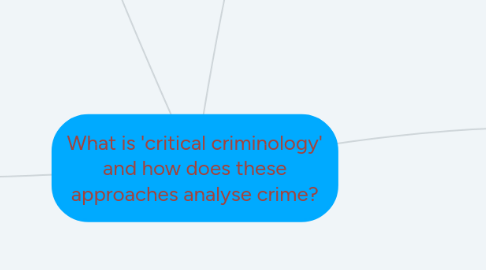
1. Critical criminology (central ideas)
1.1. Crime is a result of social conflict and inequality
1.2. Law and Criminal Justice represents the interests of those with power
1.3. Not ‘social contract’ but ‘social conflict’
2. Marxist discourse
2.1. Karl Marx
2.1.1. Social division located in means of production
2.1.2. Economy dictates all social relations
2.1.3. Wealth progressively polarized
2.1.4. Law – represents the interest of dominant class
2.1.5. ‘primitive rebellion’
2.2. Marxist influenced criminology
2.2.1. Willem Bonger (1876-1940)
2.2.1.1. Selfishness and greed were an intrinsic part of the capitalist system
2.2.1.2. Widespread ‘egoism’ which increases criminal conduct
2.2.1.3. Law acts to punish poor
2.2.1.4. Socialist society would be different
2.2.2. George Vold (1960s)
2.2.2.1. Suggests people are ‘group-orientated’ i.e. class
2.2.2.1.1. Sources of crime are the conflicts between groups. A task of criminologists is to analyse this conflict.
3. Critical – assumption that society flawed, needs to be changed
3.1. Contemporary critical criminology
3.1.1. Idea of ‘cultural hegemony’
3.1.2. Very critical of traditional criminology is part of the problem
3.1.3. Crime excludes many social harms
3.2. Criminology and social harm
3.2.1. Zemiology – study of social harm?
3.2.2. Focus on harm rather than crime
3.2.3. Challenges to power
4. Radical and critical theories
4.1. Radical – primarily class-based analysis
4.1.1. American radicalism: William Chambliss
4.1.1.1. Gap between ‘bourgeois’ and ‘proletariat’ widens – it is necessary to use increasingly harsh punitive measures to maintain order
4.1.1.2. ‘crime in not something some people do others don’t. Crime is a matter of who can pin the label on whom, and underlying this socio-political process is the structure of social relations determined by the political economy’
4.1.1.3. Crime distracts the working-class from their economic and political domination
4.1.2. British radicalism: the new criminology
4.1.2.1. The purpose of criminology is ‘to create a society in which the facts of human diversity, whether personal, organic or social, are not subject to the power to criminalize’
4.1.2.2. 6 premises of the new criminology
4.1.2.2.1. 1. Capitalism shapes social institutions, social identities and social action
4.1.2.2.2. 2. Capitalism creates class conflict and contradictions
4.1.2.2.3. 3. Crime is a response to capitalism and its contradictions
4.1.2.2.4. 4. Capitalist law facilitates and conceals crimes of domination and repression
4.1.2.2.5. 5. Crime is functional to capitalism
4.1.2.2.6. 6. Capitalism shapes society’s response to crime by shaping law
4.1.2.3. Critiques of the ‘new criminology’
4.1.2.3.1. Deterministic
4.1.2.3.2. Little empirical evidence
4.1.2.3.3. Little practical impact
4.1.2.3.4. Too idealistic
4.1.2.4. Normative criminology
4.1.2.5. Socialist future
4.1.2.6. Anti-positivist
4.1.2.7. Structural constraints on human action
4.1.2.8. Role of state is central embodiment of the capitalist class

